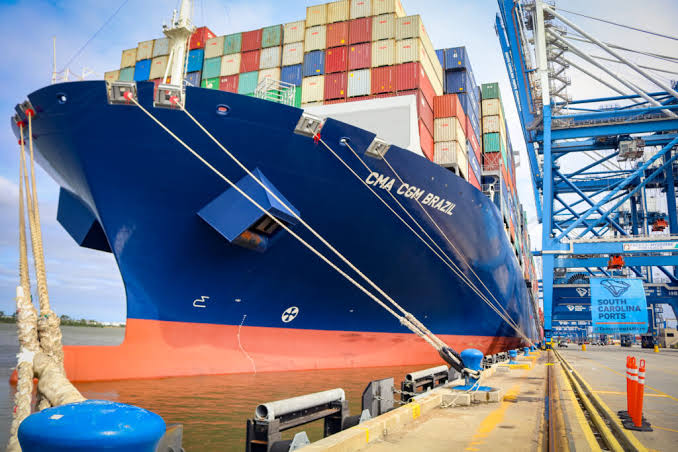
Stakeholders in the shipping industry have raised concerns over the $25m maximum Cabotage Vessel Financing Fund (CVFF) to be disbursed by Primary Lending Institutions (PLIs) to qualified indigenous shipowners. They argued that the loan it is too small to purchase standard ships.
This is even as they have called for partnerships among indigenous shipowners to be able to afford and acquire state-of-the-art ships.
Recall that the Director General of the Nigerian Maritime Administration and Safety Agency (NIMASA), Dr Bashir Jamoh had earlier noted that the beneficiaries of the CVFF are entitled to get $25 million each from any of the five PLIs.
Findings by Shipping Position Daily revealed that the agency pegged the amount at $25 million to save the fund from extinction. It was learnt that this decision was informed by how the Ship Acquisition and Ship Building Fund (SASBF) of the defunct National Maritime Authority (NMA) was killed.
The experience of its management in the disbursement of the SASBF showed that while some genuine shipping operators borrowed the money and paid back on time, others did not pay back the principal and accumulated interests.
The $25Million ceiling was also confirmed to our correspondent exclusively recently by the Chairman of the CVFF Committee set up by the Nigeria Ship Owners Association (NISA), Dr. Edward Sowho informed that stakeholders have begun to individually apply and negotiate for the disbursement of the fund with the five PLIs.
Dr Sowho had said that the negotiations are based on meeting the criteria for the disbursement and approval of request by NIMASA. He also noted that each stakeholder will have to make a request for a maximum loan of about $25 million for his or her company, before it is approved by NIMASA based on the advice of the PLIs.
However, a market survey carried out by Shipping Position Daily revealed that a standard and state-of-the-art Cargo Vessel costs an average of not less than $44m in the international market.
Speaking with our correspondent last week, the Chairman Institute of Chartered Ship Brokers (ICS), Dr Chris Ebare noted that a $25m CVFF loan cannot purchase a standard vessel, adding that sincere shipowners who are ready to invest can only purchase a fairly used seaworthy vessel with that amount.
Dr Ebare informed that getting a state-of-the-art vessel with the required international standards may not be less than $50m to $100m.
He lamented that many Nigerian shipowners do not have the capacity to acquire standard ships which has made it difficult to compete with international shipping lines who have been monopolizing the lifting of crude oil in the country.
The ICS Chairman however advised indigenous shipowners to combine forces and gather their funds together to form a shipping husbandry like other maritime nations in the world. According to him, the law permits up to 54 persons to form a shipping husbandry.
In his words: “When you say standard ships, the $25m CVFF cannot purchase a very good standard vessel. But as people will always say, half cake is better than none. But with that amount, we can get a fairly used seaworthy vessel. That is those who are ready to genuinely invest with the money. Getting a very good vessel may not be less than $100m. I think it would be a good start for them if they get $50m to $100m to get a very good vessel which can beat your chest that can go from Nigeria to China, Europe and America and can also meet international standards.
“But if the beneficiaries are able to come into what we call shipping husbandry; which means all of them will come together. Let’s say about six or seven of them are beneficiaries, they can form a company like they normally do in Greece and other countries. They can gather their resources together and if you multiply $25m by seven you would over $150m. They can put it together and make for a very good vessel so that we can boast of competing with international shipping lines who have been the ones monopolizing all lifting of our crude oil.
“My advice is that the shipowners should form shipping husbandry. I think the law allows up to 54 persons to form a shipping husbandry. We have these working in countries like Greece, Singapore, Norway and a host of others” Ebare concluded.
Also speaking, President of the Nigerian Shipowner Association (NISA), Otunba Sola Adewumi opined that access to the CVFF depends on how the Lender (Shipowner) is able to convince the PLIs in terms of his or her contribution.
Otunba Adewumi noted that although the Cabotage Act states that the Shipowner must provide 15 per cent to access the fund if he or she can provide 30 or more per cent, the bank might offer the shipowner/ lender something higher than the $25m pegged loan.
“In the first instance, I personally believe that partnership can help. Secondly, I think everything depends on how one is able to convince the PLIs in terms of your own contribution. The act that set up the CVFF requires that the Shipowner must pay 15 per cent of the fund. So, if you are able to get 30 or more per cent, I would not be surprised if the bank offers you something higher.
“I believe everybody is trying to look at the payback period. When they were initially talking about 15 per cent some people were agitating that it should be less than 10 per cent. Ordinarily, for a lender, you would be scared somehow. But I am sure if you can provide something substantial, they will be able to do something better than that. It is not a law that it should not be more than so and so. So, I believe they can still work their way out of those things.
Speaking on NISA’s plans on getting the CVFF through partnership, the association’s President noted that his members have decided to collaborate, get the loan, acquire some ships, and appoint a manager to run the affairs of the shipping line floated by the association.
“You’re automatically qualified to be a shareholder once you’re a member of NISA, but it still depends on people that are interested and contributed to the fund. Even if NISA has that company, they will still treat us as a company. We should have our own contribution as well.
“Everything I believe still depends on people that are interested in that venture. Some people might not be interested but it is open to all NISA members”, Adewumi noted.
On his part, a member of NISA, Sola Olatunji noted that although the CVFF will serve as a catalyst for the growth of the industry, the problem of the industry should be put on the front burner to engender constructive engagements between the stakeholders and the regulatory agencies.
Olatunji noted that stakeholders shall continue to make contributions and partnerships to be able to acquire vessels and to make the process of CVFF transform the sub-sector of the economy. He also noted that at the appropriate time, NISA will engage relevant stakeholders and come up with the final position on a resolution that should benefit all indigenous ship owners.
“Firstly, in my view, the gamut of issues affecting the industry is beyond CVFF. CVFF will indeed serve as a catalyst for the growth of the industry, no doubt, but the problem of the industry should be put on the front burner to engender constructive engagements between the stakeholders and the regulatory agencies.
“Secondly, I am not sure anyone in NISA has engaged the Agency (NIMASA) or the lending institutions to have arrived at the figure of $25m being circulated around. We know we shall be making contributions to be able to acquire vessels and the need for partnership by stakeholders to be able to make the process of CVFF transform the sub-sector of the economy is inevitable”, Olatunji concluded.
Follow us on Facebook/ twitter















